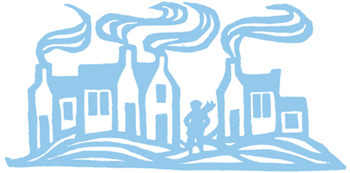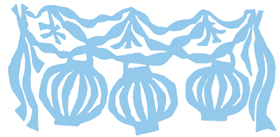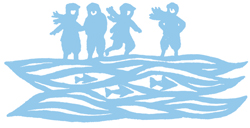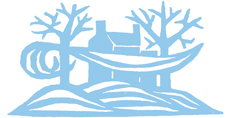A Child's Christmas in Wales (2 page)
Read A Child's Christmas in Wales Online
Authors: Dylan Thomas
“Bags of moist and many-colored jelly babies and a folded flag and a
false nose and a tramâconductor's cap and a machine that punched tickets and rang a
bell; never a catapult; once, by mistake that no one could explain, a little
hatchet; and a celluloid duck that made, when you pressed it, a most unducklike
sound, a mewing moo that an ambitious cat might make who wished to be a cow; and a
painting book in which I could make the grass, the trees, the sea and the animals
any color I pleased, and still the dazzling sky-blue sheep are grazing in the red
field under the rainbow-billed and pea-green birds. Hardboileds, toffee, fudge and
allsorts, crunches, cracknels, humbugs, glaciers, marzipan, and butterwelsh for the
Welsh. And troops of bright tin soldiers who, if they could not fight, could always
run. And Snakes-and-Families and Happy Ladders. And Easy Hobbi-Games for Little
Engineers, complete with instructions. Oh, easy for Leonardo! And a whistle to make
the dogs bark to wake up the old man next door to make him beat on the wall with his
stick to shake our picture off the wall. And a packet of cigarettes: you put one in
your mouth and you stood at the corner of the street and you waited for hours, in
vain, for an old lady to scold you for smoking a cigarette, and then with a smirk
you ate it. And then it was breakfast under the balloons.”
“Were there Uncles, like in our house?”

“There are always Uncles at Christmas. The same Uncles. And on Christmas
mornings, with dog-disturbing whistle and sugar fags, I would scour the swatched
town for the news of the little world, and find always a dead bird by the white Post
Office or by the deserted swings; perhaps a robin, all but one of his fires out. Men
and women wading or scooping back from chapel, with taproom noses and wind-bussed
cheeks, all albinos, huddled their stiff black jarring feathers against the
irreligious snow. Mistletoe hung from the gas brackets in all the front parlors;
there was sherry and walnuts and bottled beer and crackers by the dessertspoons; and
cats in their fur-abouts watched the fires; and the high-heaped fire spat, all ready
for the chestnuts and the mulling pokers. Some few large men sat in the front
parlors, without their collars, Uncles almost certainly, trying their new cigars,
holding them out judiciously at arms' length, returning them to their mouths,
coughing, then holding them out again as though waiting for the explosion; and some
few small aunts, not wanted in the kitchen, nor anywhere else for that matter, sat
on the very edges of their chairs, poised and brittle, afraid to break, like faded
cups and saucers.”
Â

Not many those mornings trod the piling streets: an old man always,
fawn-bowlered, yellow-gloved and, at this time of year, with spats of snow, would
take his constitutional to the white bowling green and back, as he would take it wet
or fine on Christmas Day or Doomsday; sometimes two hale young men, with big pipes
blazing, no overcoats and wind-blown scarfs, would trudge, unspeaking, down to the
forlorn sea, to work up an appetite, to blow away the fumes, who knows, to walk into
the waves until nothing of them was left but the two curling smoke clouds of their
inextinguishable briars. Then I would be slap-dashing home, the gravy smell of the
dinners of others, the bird smell, the brandy, the pudding and mince, coiling up to
my nostrils, when out of a snow-clogged side lane would come a boy the spit of
myself, with a pink-tipped cigarette and the violet past of a black eye, cocky as a
bullfinch, leering all to himself.
Â
I hated him on sight and sound, and would be about to put my dog whistle
to my lips and blow him off the face of Christmas when suddenly he, with a violet
wink, put
his
whistle to
his
lips and blew so stridently, so high,
so exquisitely loud, that gobbling faces, their cheeks bulged with goose, would
press against their tinsled windows, the whole length of the white echoing street.
For dinner we had turkey and blazing pudding, and after dinner the Uncles sat in
front of the fire, loosened all buttons, put their large moist hands over their
watch chains, groaned a little and slept. Mothers, aunts and sisters scuttled to and
fro, bearing tureens.

Auntie Bessie, who had already been frightened, twice, by a clock-work
mouse, whimpered at the sideboard and had some elderberry wine. The dog was sick.
Auntie Dosie had to have three aspirins, but Auntie Hannah, who liked port, stood in
the middle of the snowbound back yard, singing like a big-bosomed thrush. I would
blow up balloons to see how big they would blow up to; and, when they burst, which
they all did, the Uncles jumped and rumbled. In the rich and heavy afternoon, the
Uncles breathing like dolphins and the snow descending, I would sit among festoons
and Chinese lanterns and nibble dates and try to make a model man-o'-war, following
Instructions for Little Engineers, and produce what might be mistaken for a
sea-going tramcar.
Â

Or I would go out, my bright new boots squeaking, into the white world,
on to the seaward hill, to call on Jim and Dan and Jack and to pad through the still
streets, leaving huge deep footprints on the hidden pavements.
“I bet people will think there's been hippos.”
Â
“What would you do if you saw a hippo coming down our street?”
“I'd go like this, bang! I'd throw him over the railings and roll him
down the hill and then I'd tickle him under the ear and he'd wag his tail.”
“What would you do if you saw
two
hippos?”
Â
Iron-flanked and bellowing he-hippos clanked and battered through the
scudding snow toward us as we passed Mr. Daniel's house.
“Let's post Mr. Daniel a snowball through his letter box.”
“Let's write things in the snow.”
“Let's write, âMr. Daniel looks like a spaniel' all over his
lawn.”
Â
Or we walked on the white shore. “Can the fishes see it's snowing?”
Â
The silent one-clouded heavens drifted on to the sea. Now we were
snow-blind travelers lost on the north hills, and vast dewlapped dogs, with flasks
round their necks, ambled and shambled up to us, baying “Excelsior.” We returned
home through the poor streets where only a few children fumbled with bare red
fingers in the wheel-rutted snow and cat-called after us, their voices fading away,
as we trudged uphill, into the cries of the dock birds and the hooting of ships out
in the whirling bay. And then, at tea the recovered Uncles would be jolly; and the
ice cake loomed in the center of the table like a marble grave. Auntie Hannah laced
her tea with rum, because it was only once a year.
Â
Bring out the tall tales now that we told by the fire as the gaslight
bubbled like a diver. Ghosts whooed like owls in the long nights when I dared not
look over my shoulder; animals lurked in the cubbyhole under the stairs where the
gas meter ticked. And I remember that we went singing carols once, when there wasn't
the shaving of a moon to light the flying streets. At the end of a long road was a
drive that led to a large house, and we stumbled up the darkness of the drive that
night, each one of us afraid, each one holding a stone in his hand in case, and all
of us too brave to say a word. The wind through the trees made noises as of old and
unpleasant and maybe webfooted men wheezing in caves. We reached the black bulk of
the house.
“What shall we give them? Hark the Herald?”
“No,” Jack said, “Good King Wenceslas. I'll count three.”
Â

One, two, three, and we began to sing, our voices high and
seemingly distant in the snow-felted darkness round the house that was occupied by
nobody we knew. We stood close together, near the dark door.
Â
Good King Wenceslas looked out
On the Feast of Stephen . . .
Â
And then a small, dry voice, like the voice of someone who has not
spoken for a long time, joined our singing: a small, dry, eggshell voice from the
other side of the door: a small dry voice through the keyhole. And when we stopped
running we were outside
our
house; the front room was lovely; balloons
floated under the hot-water-bottle-gulping gas; everything was good again and shone
over the town.
“Perhaps it was a ghost,” Jim said.
“Perhaps it was trolls,” Dan said, who was always reading.
“Let's go in and see if there's any jelly left,” Jack said. And we did
that.
Â
